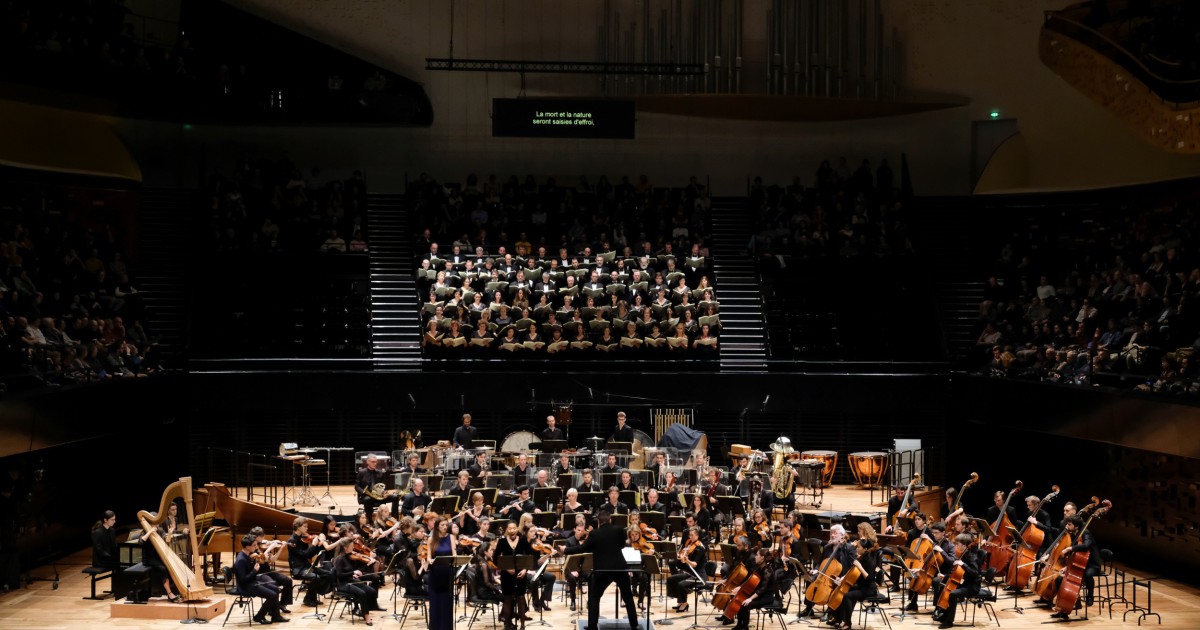
Ligeti’s Le Grand Macabre makes the Philharmonie de Paris sway
09/12/2018 - Olyrix - José Pons
György Ligeti died in 2006 and bequeathed to posterity a composite and peculiar musical body of work based notably on a complex polyphony, influenced by different ethnic music. His opera, Le Grand Macabre, belongs to the major lyrical works of the 20thcentury.
The Philharmonie de Paris was sold out for this exceptional evening dedicated to two of the central works of György Liegti, his deeply moving Requiem and his opera Le Grand Macabre through representative extracts of the latter. To see this vast enterprise through, Matthias Pintscher has decided to bring together the Ensemble Intercontemporain, of which he is the Musical Director, the Orchestre du Conservatoire de Paris and the Hungarian National Choir. Regarding the vocal soloists, he has successfully called up students from the Conservatoire de Paris, some at the end of their course, others already engaged professionally like the soprano Marie Soubestre or the baritone Jean-Christophe Lanièce, who gave a stand-out performance recently as Pelléas at the Opéra Comique (and who is soon appearing in Ariane à Naxos and in Manon at the Théâtre des Champs-Élysées).
A work in four parts and relatively short (about 30 minutes), but constantly striking, Ligeti’s Requiem (created in 1965) opens with a muffled choir which seems to come from the very depths of the soul. It hoards up worries and fears, a reflection of an artist tortured by disappearance and death. Its interpretation relies on concentration, force and overall consistency. The third movement, the Dies Irae, most probably the most intensely ecstatic, introduces the soprano and mezzo-soprano, whose parts accumulate difficulties. The extremes of the voice are solicited, with perilous octave jumps that must not, for all that, distract from the smoothness or expressiveness. The young soprano Makeda Monnet displays all the essential virtuosity shooting high-pitched and very shrill notes. By her side, the mezzo-soprano Victoire Bunel draws on well-mastered vocal material, great breath control and delivers a particularly convincing performance. The voice appears rich in harmonics, resonant, with relaxed low notes and varied colours: most certainly more than just grand promises! After this movement, which profoundly touches the listener, the closing Lacrimosa goes back to relative calmness, even apparent serenity.
The second part of the concert shows another aspect of Ligeti, most probably more mischievous, with these extracts (45 minutes, out of about two hours) from his opera Le Grand Macabre, an opera in two acts and four scenes, created in 1978 in Stockholm. It was presented in Paris at the Palais Garnier in 1981 in French, in a stimulating production by Daniel Mesguich that made its mark. The libretto is directly inspired by an earthy, almost grotesque play by Michel de Ghelderode. Here, Ligeti seeks to exorcise death, a fundamental, constantly present theme, but with a new ironic notion, a sudden burst of hope. His music, intensely pictorial, intensifies still further, becomes more complex, dares the trivial, or even the obscene. It draws ardently on certain scores from the repertoire (Beethoven’s Heroic Symphony for example), by transforming them, or on opera sources themselves as with the famous initial prelude that parodies, using 12 car horns, the toccata of trumpets which opens Monteverdi’s L’Orfeo.
The vocal profiles appear particularly classified and, for some, inherited from tradition. Thus Amando/Amanda, the couple in love, is reserved for two opera singers, evoking both spiritually and carnally Marschallin and Octavian in the first act of the Knight of the Rose by Richard Strauss. The singing of both performers seems to unite and intertwine in a vast orgasm underlined by the music and power of the orchestra. Marie Soubestre gives us a soprano of rare purity, of proven power, an ideal legato opposite Victoire Bunel. The lyrical tenor Benoît Rameau, with clear high notes, displays a lot of verve and just fantasia in the role of Piet the Pot, a sort of buffoon who makes light of the formidable Nekrotzar, Le Grand Macabre has come to destroy the imaginary country of Breughellande and sow the seeds of the apocalypse there. The latter finds, in Jean-Christophe Lanièce a highly skilful performer. His beautiful baritone voice, well controlled and characterised, even if the low notes still need perfecting, broad and with an excellent pronunciation, exploits in full the ambitious part given to this multifaceted character. The magnificent final passacaille introduces, on top of the previous soloists, the other performers of the work, Borbàla Kiss, mezzo-soprano, Jenö Dekàn, tenor, Olivier Gourdy, bass and Makena Monnet, soprano. The whole, by its balance and its intensity, does full justice to this page of quality which closes a lyrical work – sung here in German –, totally atypical where the grotesque reigns absolutely.
Matthias Pintscher conducts with a conductor’s baton both precise and generous, his conducting full of conviction, he draws on the resources of both orchestras combined, even if it means covering somewhat the voices of these young singers. The Hungarian National Choir under the choirmaster Csaba Somos captivates by the fullness of its different sections and their control that are revealed right up to the demands of the composer which, here, are still extreme, notably in the deep low notes of the basses. The enthusiastic welcome reserved for this evening in homage to György Ligeti proves that the music of our time will always find its public when sufficient means are deployed and quality imposes its presence.